Mises, Ludwig von. Theory and History: An Interpretation of Social and Economic Evolution
Подождите немного. Документ загружается.

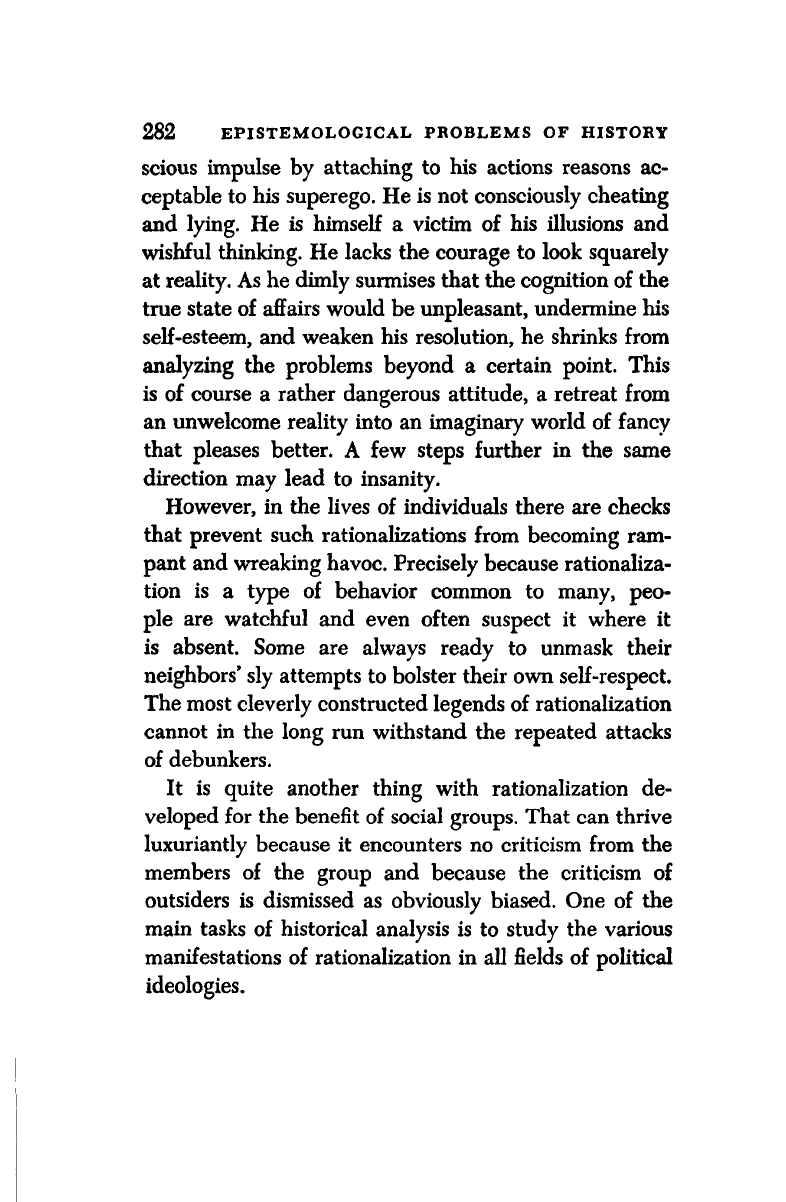
282 EPISTEMOLOGICAL PROBLEMS OF HISTORY
scious impulse by attaching to his actions reasons ac-
ceptable to his superego. He is not consciously cheating
and lying. He is himself a victim of his illusions and
wishful thinking. He lacks the courage to look squarely
at reality. As he dimly surmises that the cognition of the
true state of affairs would be unpleasant, undermine his
self-esteem, and weaken his resolution, he shrinks from
analyzing the problems beyond a certain point. This
is of course a rather dangerous attitude, a retreat from
an unwelcome reality into an imaginary world of fancy
that pleases better. A few steps further in the same
direction may lead to insanity.
However, in the lives of individuals there are checks
that prevent such rationalizations from becoming ram-
pant and wreaking havoc. Precisely because rationaliza-
tion is a type of behavior common to many, peo-
ple are watchful and even often suspect it where it
is absent. Some are always ready to unmask their
neighbors' sly attempts to bolster their own self-respect.
The most cleverly constructed legends of rationalization
cannot in the long run withstand the repeated attacks
of debunkers.
It is quite another thing with rationalization de-
veloped for the benefit of social groups. That can thrive
luxuriantly because it encounters no criticism from the
members of the group and because the criticism of
outsiders is dismissed as obviously biased. One of the
main tasks of historical analysis is to study the various
manifestations of rationalization in all fields of political
ideologies.
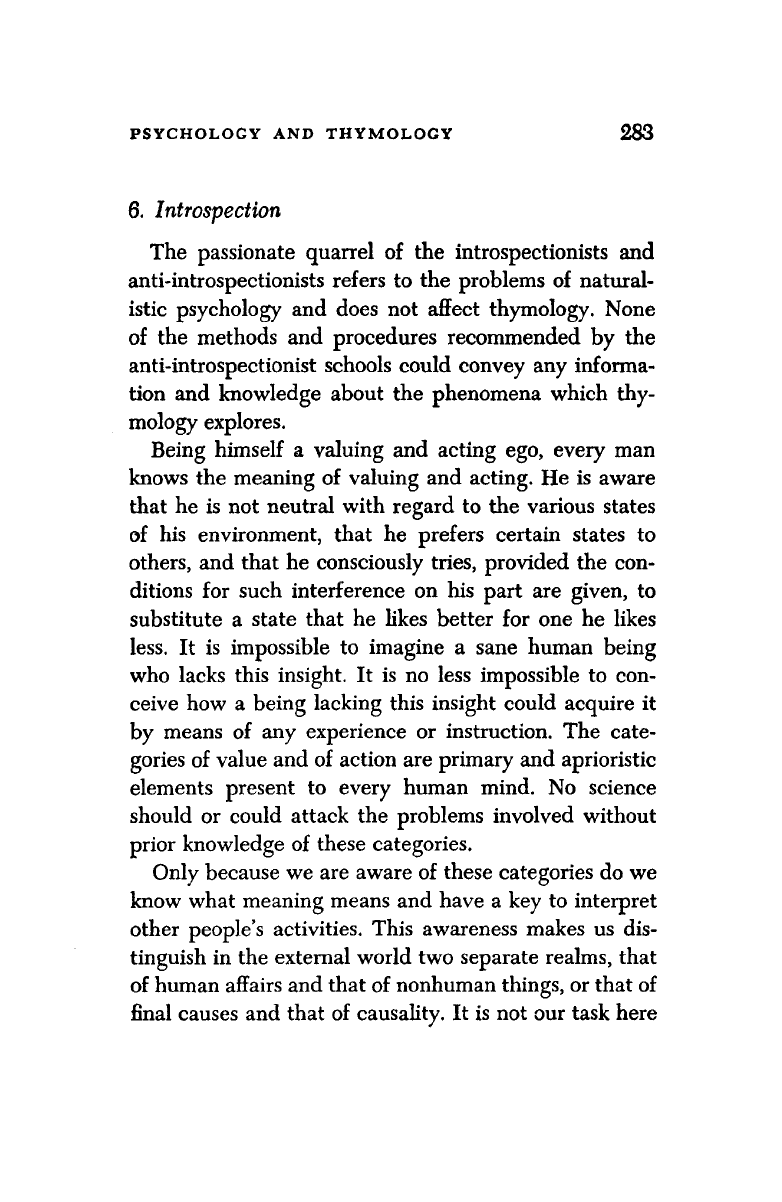
PSYCHOLOGY AND THYMOLOGY 283
6. Introspection
The passionate quarrel of the introspectionists and
anti-introspectionists refers to the problems of natural-
istic psychology and does not affect thymology. None
of the methods and procedures recommended by the
anti-introspectionist schools could convey any informa-
tion and knowledge about the phenomena which thy-
mology explores.
Being himself a valuing and acting ego, every man
knows the meaning of valuing and acting. He is aware
that he is not neutral with regard to the various states
of his environment, that he prefers certain states to
others, and that he consciously tries, provided the con-
ditions for such interference on his part are given, to
substitute a state that he likes better for one he likes
less.
It is impossible to imagine a sane human being
who lacks this insight. It is no less impossible to con-
ceive how a being lacking this insight could acquire it
by means of any experience or instruction. The cate-
gories of value and of action are primary and aprioristic
elements present to every human mind. No science
should or could attack the problems involved without
prior knowledge of these categories.
Only because we are aware of these categories do we
know what meaning means and have a key to interpret
other people's activities. This awareness makes us dis-
tinguish in the external world two separate realms, that
of human affairs and that of nonhuman things, or that of
final causes and that of causality. It is not our task here
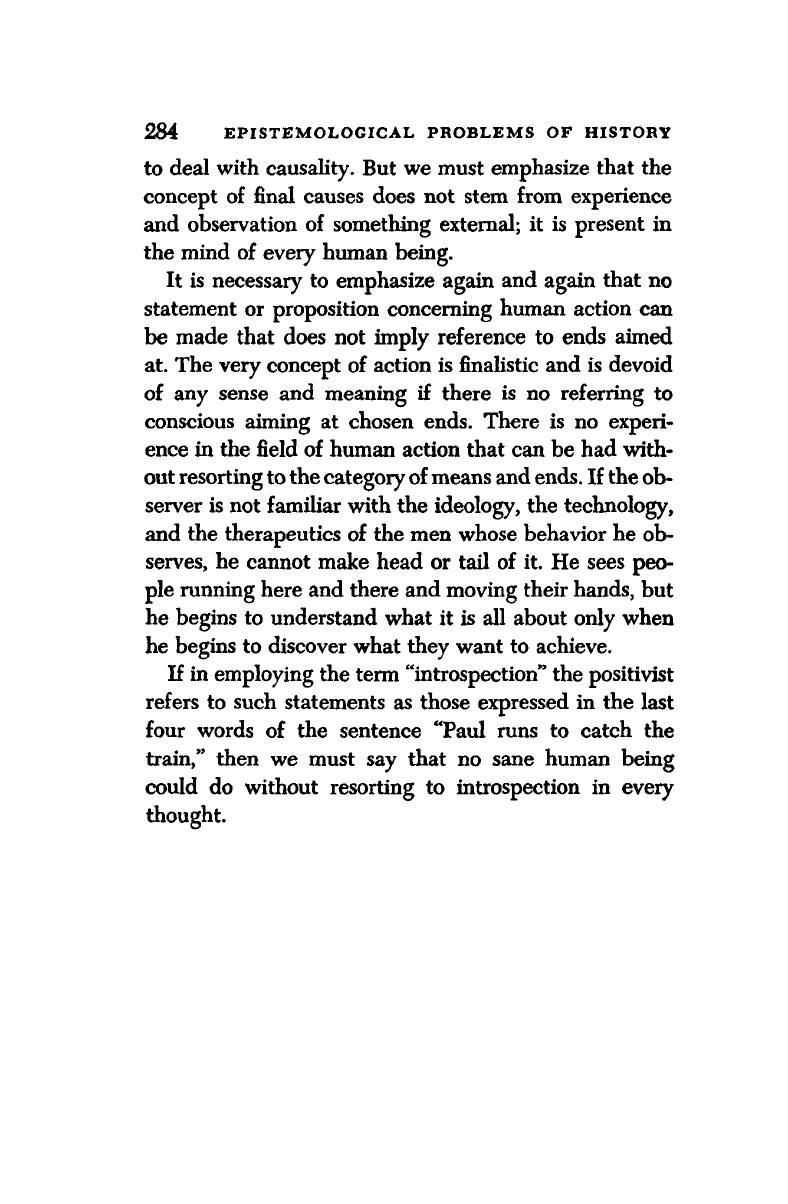
284 EPISTEMOLOGICAL PROBLEMS OF HISTORY
to deal with causality. But we must emphasize that the
concept of final causes does not stem from experience
and observation of something external; it is present in
the mind of every human being.
It is necessary to emphasize again and again that no
statement or proposition concerning human action can
be made that does not imply reference to ends aimed
at. The very concept of action is finalistic and is devoid
of any sense and meaning if there is no referring to
conscious aiming at chosen ends. There is no experi-
ence in the field of human action that can be had with-
out resorting to the category of means and
ends.
If the
ob-
server is not familiar with the ideology, the technology,
and the therapeutics of the men whose behavior he ob-
serves, he cannot make head or tail of it. He sees peo-
ple running here and there and moving their hands, but
he begins to understand what it is all about only when
he begins to discover what they want to achieve.
If in employing the term "introspection" the positivist
refers to such statements as those expressed in the last
four words of the sentence "Paul runs to catch the
train," then we must say that no sane human being
could do without resorting to introspection in every
thought.
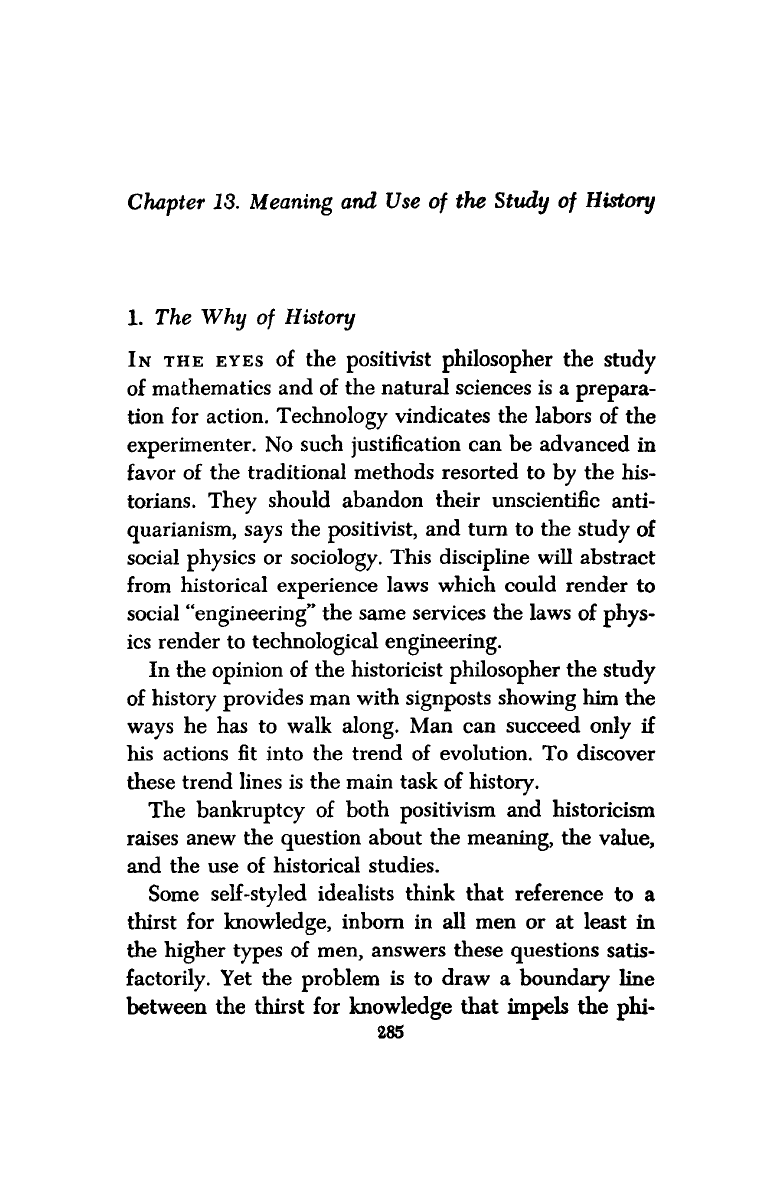
Chapter 13.
Meaning
and Use of the Study of History
1.
The Why of History
IN
THE EYES of the positivist philosopher the study
of mathematics and of the natural sciences is a prepara-
tion for action. Technology vindicates the labors of the
experimenter. No such justification can be advanced in
favor of the traditional methods resorted to by the his-
torians. They should abandon their unscientific anti-
quarianism, says the positivist, and turn to the study of
social physics or sociology. This discipline will abstract
from historical experience laws which could render to
social "engineering" the same services the laws of phys-
ics render to technological engineering.
In the opinion of the historicist philosopher the study
of history provides man with signposts showing him the
ways he has to walk along. Man can succeed only if
his actions fit into the trend of evolution. To discover
these trend lines is the main task of history.
The bankruptcy of both positivism and historicism
raises anew the question about the meaning, the value,
and the use of historical studies.
Some self-styled idealists think that reference to a
thirst for knowledge, inborn in all men or at least in
the higher types of men, answers these questions satis-
factorily. Yet the problem is to draw a boundary line
between the thirst for knowledge that impels the phi-
285
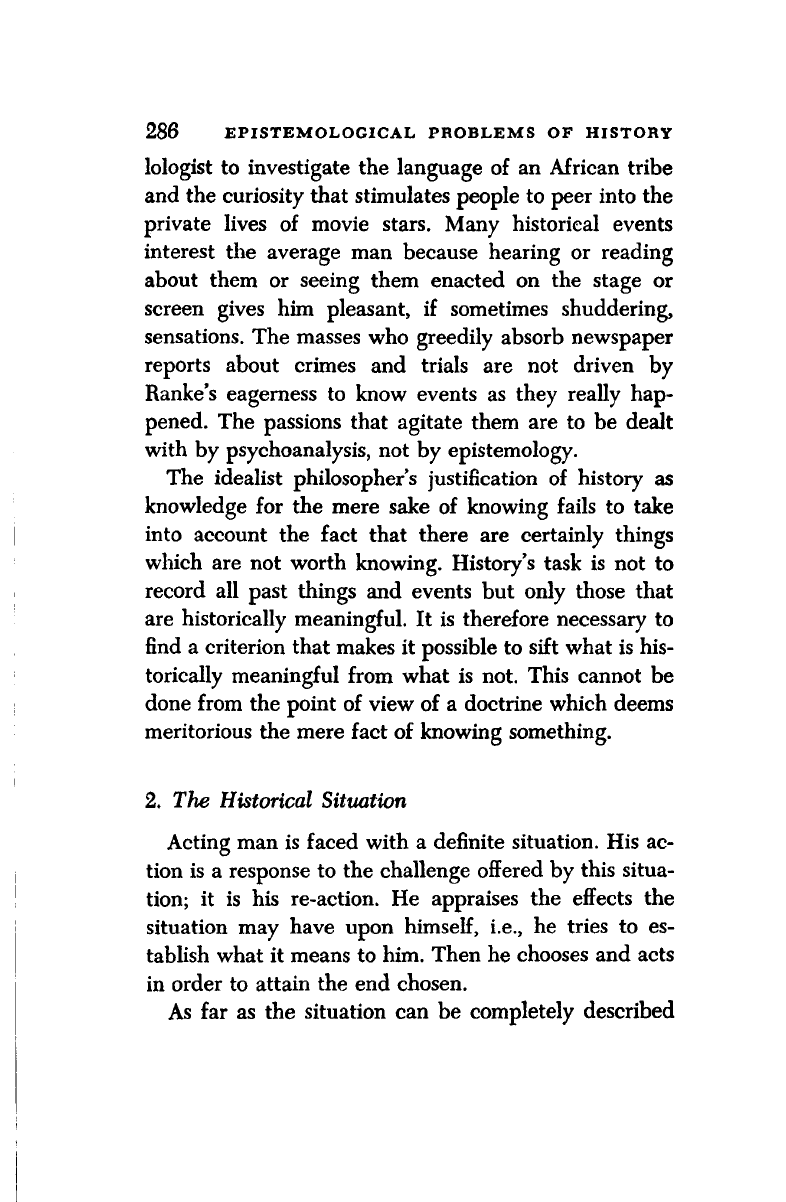
286 EPISTEMOLOGICAL PROBLEMS OF HISTORY
lologist to investigate the language of an African tribe
and the curiosity that stimulates people to peer into the
private lives of movie stars. Many historical events
interest the average man because hearing or reading
about them or seeing them enacted on the stage or
screen gives him pleasant, if sometimes shuddering,
sensations. The masses who greedily absorb newspaper
reports about crimes and trials are not driven by
Ranke's eagerness to know events as they really hap-
pened. The passions that agitate them are to be dealt
with by psychoanalysis, not by epistemology.
The idealist philosopher's justification of history as
knowledge for the mere sake of knowing fails to take
into account the fact that there are certainly things
which are not worth knowing. History's task is not to
record all past things and events but only those that
are historically meaningful. It is therefore necessary to
find a criterion that makes it possible to sift what is his-
torically meaningful from what is not. This cannot be
done from the point of view of a doctrine which deems
meritorious the mere fact of knowing something.
2.
The Historical Situation
Acting man is faced with a definite situation. His ac-
tion is a response to the challenge offered by this situa-
tion;
it is his re-action. He appraises the effects the
situation may have upon himself, i.e., he tries to es-
tablish what it means to him. Then he chooses and acts
in order to attain the end chosen.
As far as the situation can be completely described
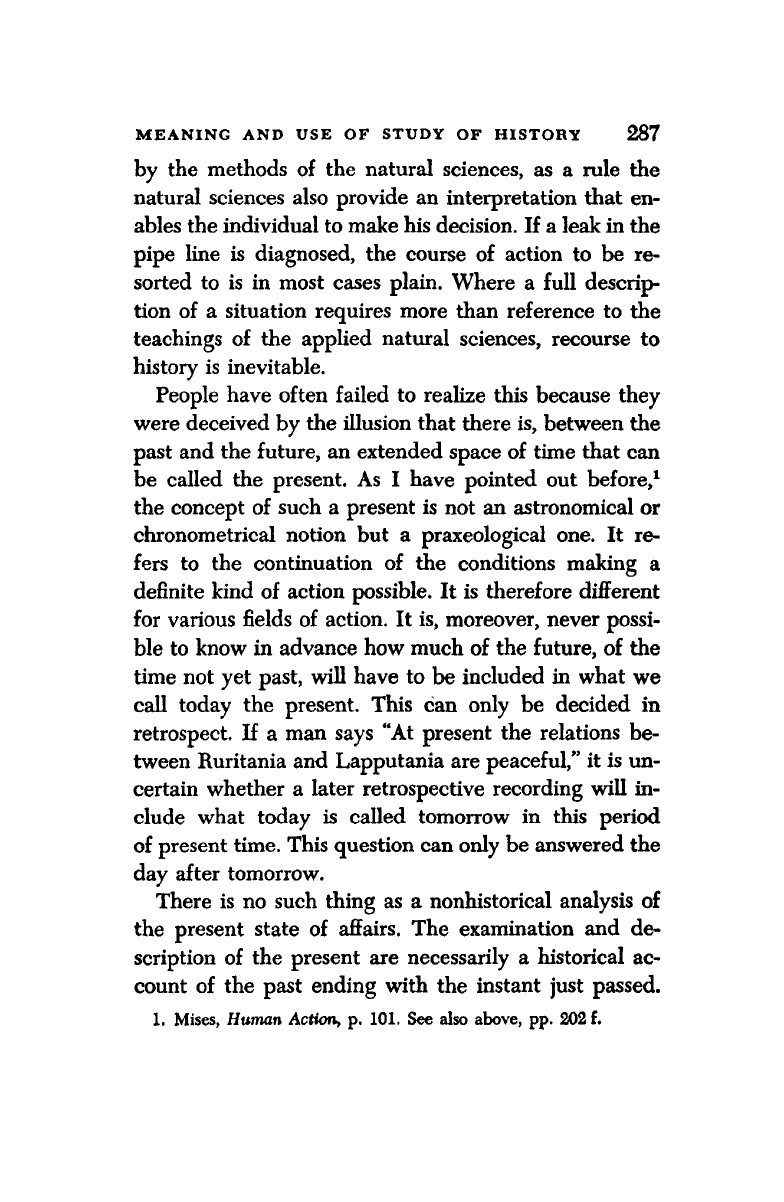
MEANING AND USE OF STUDY OF HISTORY 287
by the methods of the natural sciences, as a rule the
natural sciences also provide an interpretation that en-
ables the individual to make his decision. If a leak in the
pipe line is diagnosed, the course of action to be re-
sorted to is in most cases plain. Where a full descrip-
tion of a situation requires more than reference to the
teachings of the applied natural sciences, recourse to
history is inevitable.
People have often failed to realize this because they
were deceived by the illusion that there is, between the
past and the future, an extended space of time that can
be called the present. As I have pointed out before,
1
the concept of such a present is not an astronomical or
chronometrical notion but a praxeological one. It re-
fers to the continuation of the conditions making a
definite kind of action possible. It is therefore different
for various fields of action. It is, moreover, never possi-
ble to know in advance how much of the future, of the
time not yet past, will have to be included in what we
call today the present. This can only be decided in
retrospect. If a man says "At present the relations be-
tween Ruritania and Lapputania are peaceful," it is un-
certain whether a later retrospective recording will in-
clude what today is called tomorrow in this period
of present time. This question can only be answered the
day after tomorrow.
There is no such thing as a nonhistorical analysis of
the present state of affairs. The examination and de-
scription of the present are necessarily a historical ac-
count of the past ending with the instant just passed.
1.
Mises, Human Action, p. 101. See also above, pp. 202 f.
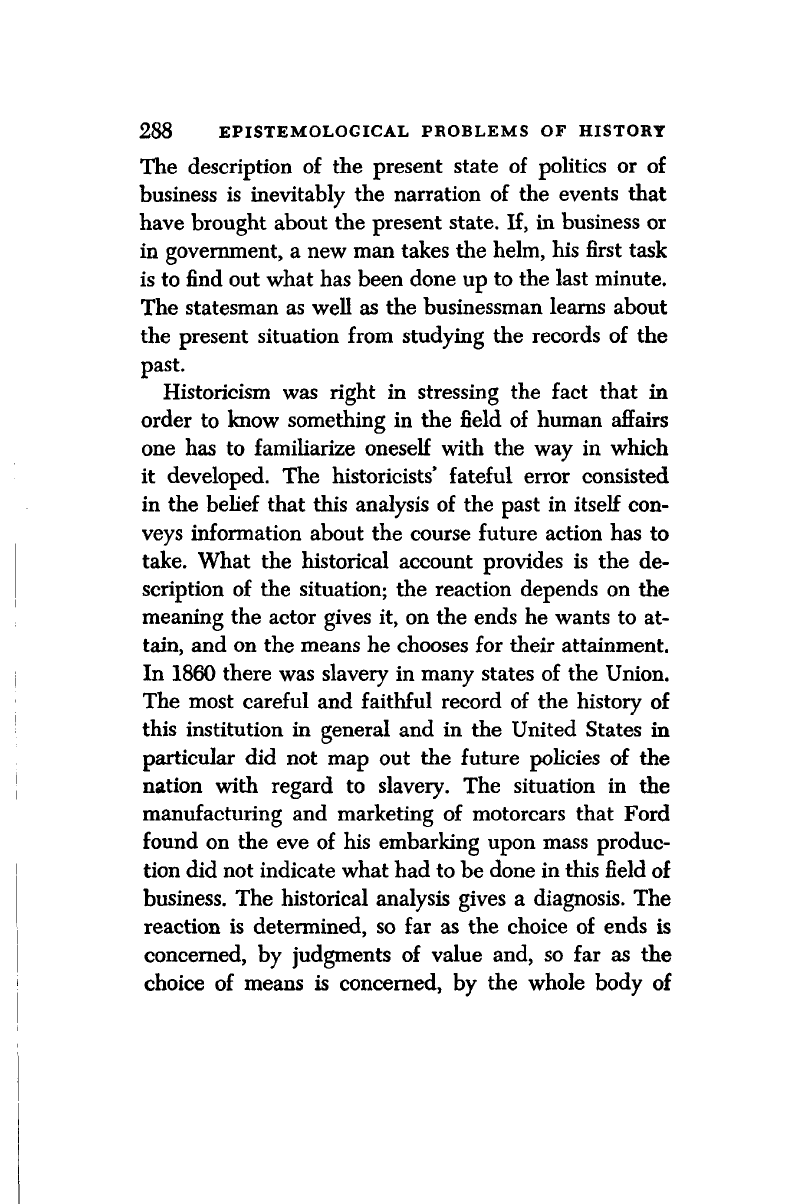
288 EPISTEMOLOGICAL PROBLEMS OF HISTORY
The description of the present state of politics or of
business is inevitably the narration of the events that
have brought about the present state. If, in business or
in government, a new man takes the helm, his first task
is to find out what has been done up to the last minute.
The statesman as well as the businessman learns about
the present situation from studying the records of the
past.
Historicism was right in stressing the fact that in
order to know something in the field of human affairs
one has to familiarize oneself with the way in which
it developed. The historicists' fateful error consisted
in the belief that this analysis of the past in itself con-
veys information about the course future action has to
take. What the historical account provides is the de-
scription of the situation; the reaction depends on the
meaning the actor gives it, on the ends he wants to at-
tain,
and on the means he chooses for their attainment.
In 1860 there was slavery in many states of the Union.
The most careful and faithful record of the history of
this institution in general and in the United States in
particular did not map out the future policies of the
nation with regard to slavery. The situation in the
manufacturing and marketing of motorcars that Ford
found on the eve of his embarking upon mass produc-
tion did not indicate what had to be done in this field of
business. The historical analysis gives a diagnosis. The
reaction is determined, so far as the choice of ends is
concerned, by judgments of value and, so far as the
choice of means is concerned, by the whole body of
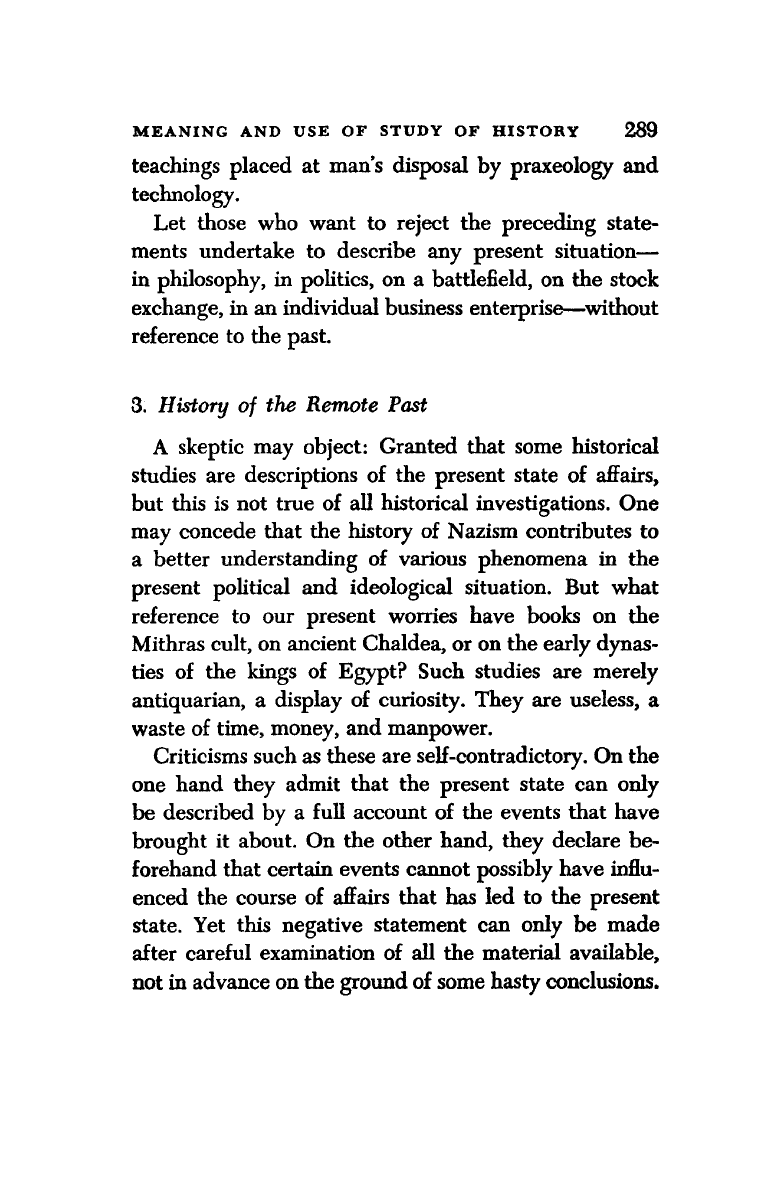
MEANING AND USE OF STUDY OF HISTORY 289
teachings placed at man's disposal by praxeology and
technology.
Let those who want to reject the preceding state-
ments undertake to describe any present situation—
in philosophy, in politics, on a battlefield, on the stock
exchange, in an individual business enterprise—without
reference to the past.
3.
History of the Remote Past
A skeptic may object: Granted that some historical
studies are descriptions of the present state of affairs,
but this is not true of all historical investigations. One
may concede that the history of Nazism contributes to
a better understanding of various phenomena in the
present political and ideological situation. But what
reference to our present worries have books on the
Mithras cult, on ancient Chaldea, or on the early dynas-
ties of the kings of Egypt? Such studies are merely
antiquarian, a display of curiosity. They are useless, a
waste of time, money, and manpower.
Criticisms such as these are self-contradictory. On the
one hand they admit that the present state can only
be described by a full account of the events that have
brought it about. On the other hand, they declare be-
forehand that certain events cannot possibly have influ-
enced the course of affairs that has led to the present
state. Yet this negative statement can only be made
after careful examination of all the material available,
not in advance on the ground of some hasty conclusions.
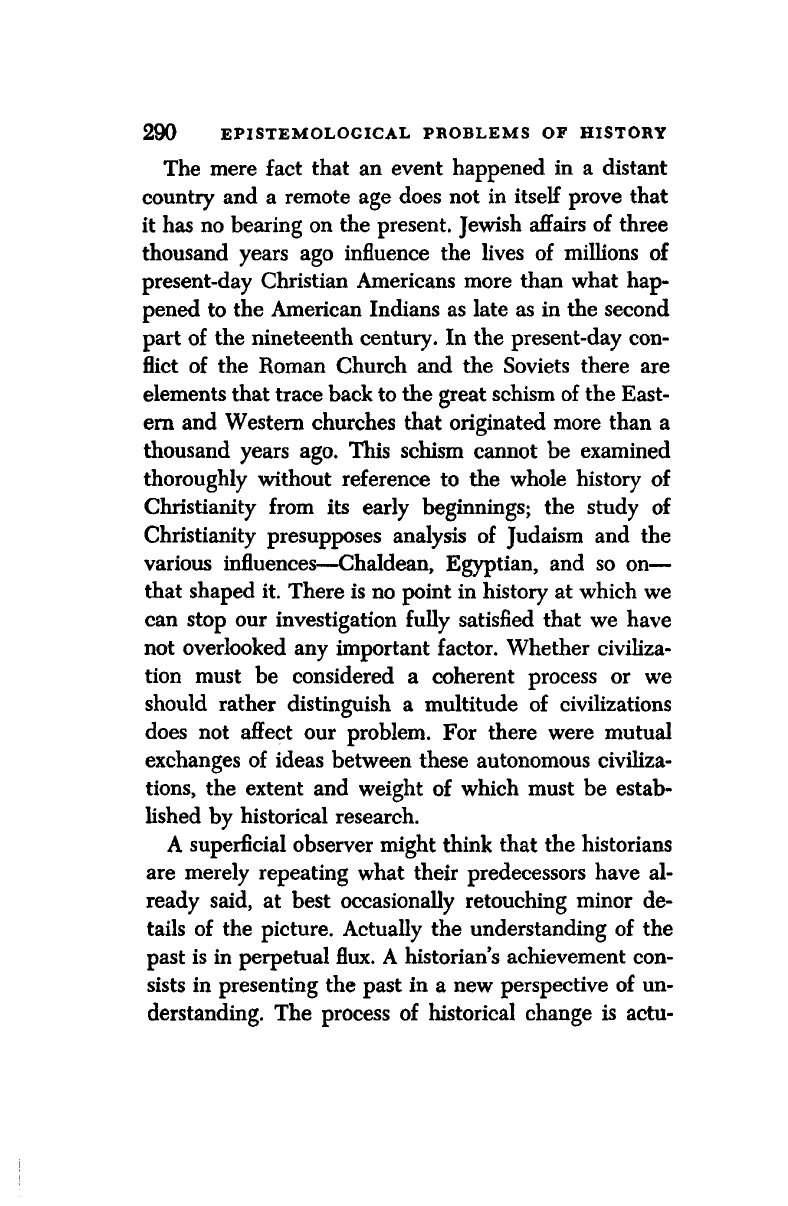
290 EPISTEMOLOGICAL PROBLEMS OF HISTORY
The mere fact that an event happened in a distant
country and a remote age does not in itself prove that
it has no bearing on the present. Jewish affairs of three
thousand years ago influence the lives of millions of
present-day Christian Americans more than what hap-
pened to the American Indians as late as in the second
part of the nineteenth century. In the present-day con-
flict of the Roman Church and the Soviets there are
elements that trace back to the great schism of the East-
ern and Western churches that originated more than a
thousand years ago. This schism cannot be examined
thoroughly without reference to the whole history of
Christianity from its early beginnings; the study of
Christianity presupposes analysis of Judaism and the
various influences—Chaldean, Egyptian, and so on—
that shaped it. There is no point in history at which we
can stop our investigation fully satisfied that we have
not overlooked any important factor. Whether civiliza-
tion must be considered a coherent process or we
should rather distinguish a multitude of civilizations
does not affect our problem. For there were mutual
exchanges of ideas between these autonomous civiliza-
tions,
the extent and weight of which must be estab-
lished by historical research.
A superficial observer might think that the historians
are merely repeating what their predecessors have al-
ready said, at best occasionally retouching minor de-
tails of the picture. Actually the understanding of the
past is in perpetual flux. A historian's achievement con-
sists in presenting the past in a new perspective of un-
derstanding. The process of historical change is actu-
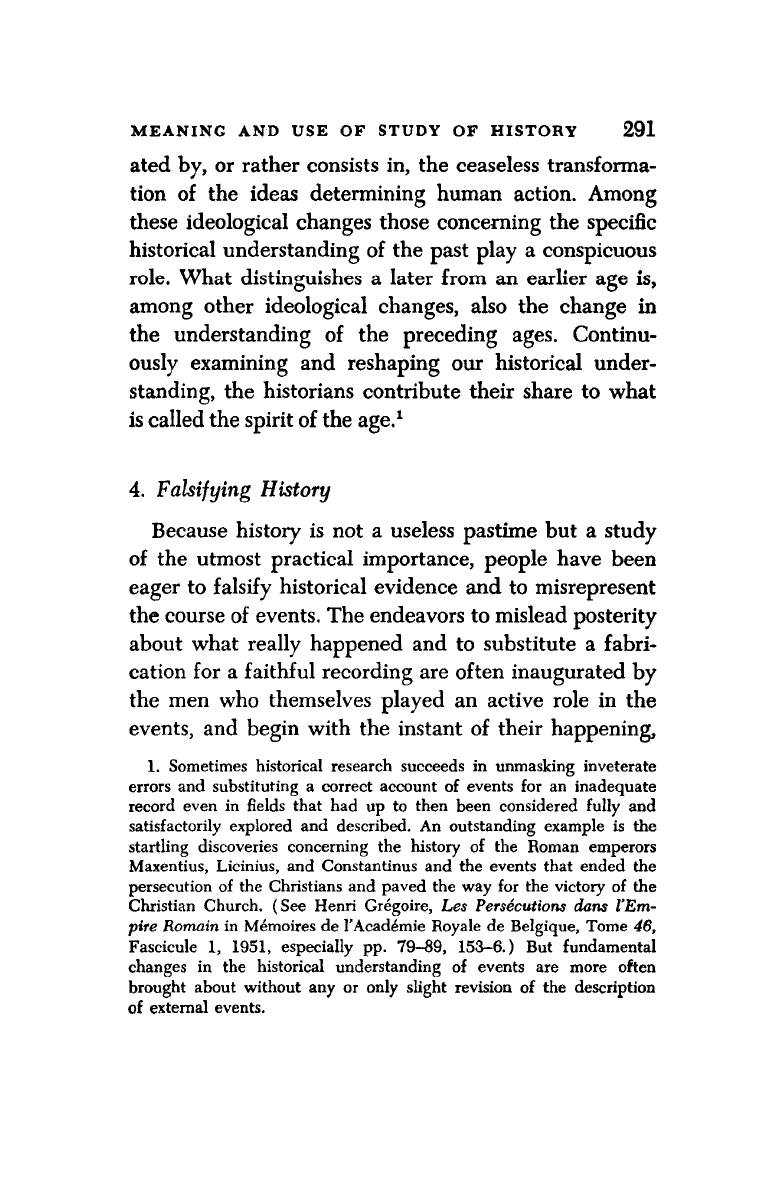
MEANING AND USE OF STUDY OF HISTORY 291
ated by, or rather consists in, the ceaseless transforma-
tion of the ideas determining human action. Among
these ideological changes those concerning the specific
historical understanding of the past play a conspicuous
role. What distinguishes a later from an earlier age is,
among other ideological changes, also the change in
the understanding of the preceding ages. Continu-
ously examining and reshaping our historical under-
standing, the historians contribute their share to what
is called the spirit of the age.
1
4.
Falsifying History
Because history is not a useless pastime but a study
of the utmost practical importance, people have been
eager to falsify historical evidence and to misrepresent
the course of events. The endeavors to mislead posterity
about what really happened and to substitute a fabri-
cation for a faithful recording are often inaugurated by
the men who themselves played an active role in the
events, and begin with the instant of their happening,
1.
Sometimes historical research succeeds in unmasking inveterate
errors and substituting a correct account of events for an inadequate
record even in fields that had up to then been considered fully and
satisfactorily explored and described. An outstanding example is the
startling discoveries concerning the history of the Roman emperors
Maxentius, Licinius, and Constantinus and the events that ended the
persecution of the Christians and paved the way for the victory of the
Christian Church. (See Henri Gregoire, Les Persecutions dans VEm-
pire Romain in Memoires de l'Academie Royale de Belgique, Tome 46,
Fascicule 1, 1951, especially pp. 79-89, 153-6.) But fundamental
changes in the historical understanding of events are more often
brought about without any or only slight revision of the description
of external events.
